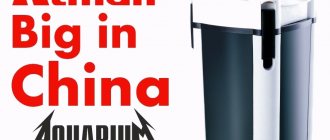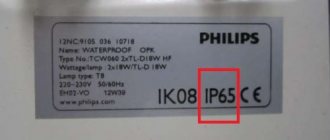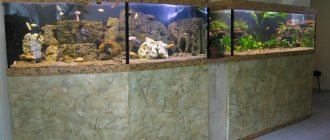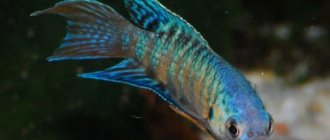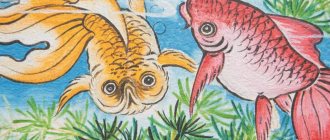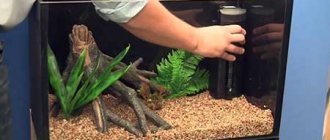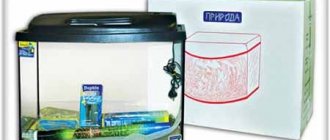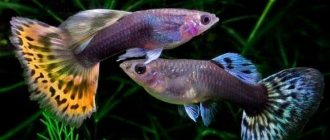(link)
Anniversary concert 2021 in Samara
| « | “Only an uneducated Murzik like you could not know Grebenshchikov.” - Grebenshchikova? And who is it? - This is God, the radiance comes from him. | » |
| - "Assa" | ||
"Aquarium"
- one of the most famous bands of Leningrad rock and Russian rock in general. The merits of this group can hardly be overestimated - before Boris Grebenshchikov, rock in Russian did not have a clearly developed language of its own, and besides, the group managed to cling in time to such a way of raising its fame as the constant release of its own studio albums. Well, rockers in the USSR released studio albums before them (for example, Yuri Morozov became widely famous for his albums, since he did not have a line-up for concerts), but it was Aquarium, with the participation of the first Soviet sound producer Andrei Tropillo, that put this thing on stream, and in the end the glory of the group has not faded to this day, although the history of the Aquarium has seen many dramatic turns. It has existed in one form or another continuously since 1972, although it ceased to exist around 1991-92 and 1997-98.
Where did the name come from? Gunitsky shared his story with Yandex.Zen. One day he and BG were going to visit the bass player. And outside the bus window we saw a bar sign. It was called "Aquarium". This bar, of course, is long gone.
According to another version (voiced by BG), the name was born not on a bus, but on a bridge, during a brainstorming session. And then aquariums were generally called all drinking establishments inside central grocery stores with high, floor-to-ceiling windows - so from the street you could clearly see all the fauna, which went swimming in the evening.
The circle above A is also there for a reason. He shows that this is not an ordinary letter A, but a secret letter A. (BG)
History, discography and most important participants[edit]
- Boris Borisovich Grebenshchikov
(aka BG, aka Greben, aka Bob) - Our Everything of Russian rock: his influence can only be compared with the influence of Pushkin on Russian poetry in general, Blok on the poetry of the Silver Age and Okudzhava on the original song. That is, this is exactly the person who created and systematized the creative method, which after him became the basis of the genre of rock poetry in Russia, and rock compositions too. In fact, Boris Borisovich was also one of the first Russian postmodernists. Firstly, his work is extremely eclectic; he played folk, punk, blues, and Russian folk songs (what is it, the genre of Russian dark folk also owes something to him for its appearance!), and also composed lyrics for them, as related to the same Blok and Zabolotsky, and frankly vulgar in language and content. Secondly, BG’s work is filled with a lot of references to world culture - from Lao Tzu to Tolkien, from Vertinsky to Patti Smith; sometimes it comes to direct borrowing. Therefore, discussing whether BG is plagiarizing or an allusion has been a favorite pastime of fans for half a century, and there is no end in sight to these disputes. Finally, BG diligently avoids explaining the meaning of his songs, inviting listeners to do this, and he himself likes to laugh it off. The only permanent member of the Aquarium, the group itself, under him, experienced repeated birth and death with subsequent rebirth. Father of the famous actress Alisa Grebenshchikova. He hosts the radio program “Aerostat,” which is very interesting for music lovers. - Anatoly Avgustovich “George” Gunitsky
is the second most important person in the history of the Aquarium, co-founder of the group. He himself took part in it for a short time, playing the drums, but then moved on to absurdist poetry and theater that were closer to his soul. Nevertheless, he played and continues to play a significant role in the life of the group - partly because he was one of the leaders of the Leningrad rock club, partly because even after his departure Grebenshchikov continued to turn to George’s poetry in order to write songs. However, other artists also wrote about his poems - suffice it to say that one of Vyacheslav Butusov’s first solo hits, “Gibraltar-Labrador,” was written specifically based on Gunitsky’s poems.
Nota bene:
in the sections below only the so-called “Natural albums of Aquarium and BG” are listed, that is, as a rule, studio ones. The complete discography of Aquarium and BG with all the collections, singles, film soundtracks and concert albums is truly huge and numbers about a hundred releases.
Aquarium 1.0 (1972—1991)[edit]
The group formed around mathematics students Grebenshchikov and Gunitsky during their creative experiments at Leningrad University, but for many years it could not take shape and decide whether it was a rock group or an independent theater studio. The process itself dragged on for about 8 years, partly due to creative issues, partly due to such a serious factor as the Soviet Army, in which most of the Aquarium participants had to serve in one way or another (except for Grebenshchikov, he managed to receive a higher education). In 1977-1980, most of the musicians paid off their debt to their homeland, and therefore the group finally took shape. The first widespread event through which the group became known was their performance at the Tbilisi Rock Festival in 1980. The group’s show staged on stage (BG’s green-dyed beard, Seva Gakkel’s sawing of his cello, which was laid on BG, who was lying on the stage) and the jury’s mishearings in the song “Marina” caused a terrible scandal, so that upon arrival home the participant learned that they had been expelled from the Komsomol and fired from all jobs. But they didn’t despair, they got a job as janitors and watchmen, completely devoting themselves to music. In 1981, the group was one of the first to become members of the newly formed rock club and very soon took a leading position in it. Even during times of pressure from the security services, this did not stop the group from regularly giving concerts outside the rock club. First of all, these were “apartment dwellers” - that is, naturally “from city to city; from house to house, to the apartments of other people’s friends” ©. BG and the musicians gave concerts in private apartments, which in 1983-1985 was fraught with the risk of going to jail for “illegal business,” because, of course, they were not held for free. But since 1986, cultural policy in the country has become more liberal, and the group came out of hiding. However, the classic line-up could not withstand the surge of popularity and actually disbanded around 1988. In 1989 and 1990, Grebenshchikov tried without much success to achieve recognition in the West, but then finally returned to his homeland. The group gave its last concert in 1991 at the anniversary of the Leningrad Rock Club, and later reunited only once for the 25th anniversary in 1997.
- Vsevolod Gakkel
- cello, vocals. One of the three “number two people” in the classic line-up of the group and, in fact, one of the first cellists in rock music in general, long before these Apocalyptics of yours. After the breakup of the group, he wrote a book of memoirs, “Aquarium as a way to care for a tennis court,” and also worked as the art director of the cult TamTam club in the early 1990s, which gave us such groups as the King and the Jester and the Pilot. - Andrey "Dyusha" Romanov
- the second of the "people number two", flute, keys, vocals. He composed his own songs no less often than BG, and after the collapse of Aquarium he assembled his own group, Trefoil, in which he worked throughout the 1990s. He also left a book of memories entitled “The History of the Aquarium. The Flutist's Book. In 2000, he died of a heart attack right backstage at his concert while tuning his guitar. It was he who wrote the song “Ignatius song”, later famous by DDT (aka “This is your homeland, son”) - Mikhail "Fan" Fainstein
- bassist of the first half of the 1980s, the third "number two" in the group. He left no memories (except for many interviews); in addition to bass, he was responsible for many organizational matters in the group. On acoustic albums he performed as a percussionist, after joining Titov’s group, he focused on percussion - tambourines, bongos, etc. In the USSR, due to problems with the fifth point, he lived under his wife’s last name - Vasiliev. He died in 2013 from pancreatitis. - Sergey Kuryokhin
- yes, the great trickster played in the Aquarium often and with pleasure. His keys can be heard in the albums “Triangle”, “Radio Africa”, “Children of December”. After about 1986, he left the group, quite badly spoiling his relationship with BG, but in 1991 their friendship was restored. - Alexander Titov
is the bass player who replaced Feinstein. At the same time, he played with the Kino group, but in 1986 he finally focused on Aquarium. The most constant member of the group after Boris Borisych - he played in the 2.0, and in the 3.0, and in the current 4.0 - Alexander “Roasted Elephant” Lyapin
is a virtuoso guitarist and at the same time one of the most problematic members of the group. Many witnesses say (although not all confirm) that it was his creative disputes with Kuryokhin that inspired Grebenshchikov to create the song “Rock and Roll is Dead.” - Alexander Kussul
is a violinist who immortalized the album “Day of Silver” with his parts. All his colleagues considered him the most talented of the Aquarium violinists. In 1986 he died tragically - drowned while swimming across the Volga. - There were many other participants, but they were not as memetic. Drummers Pyotr Troshchenkov, Evgeny Guberman and Alexander Kodrashkin are worth mentioning. And also, briefly and unnoticed, the then unknown Edmund Shklyarsky ran by.
Natural albums[edit]
- 1981 - Blue album (the first album recorded by Andrei Tropillo)
- 1981 - Triangle
- 1981 - History of the Aquarium. Volume 2 Electricity (part concert and part studio album of songs created before the Blue Album)
- 1982 - History of the Aquarium. Volume 1 Acoustics (studio collection of songs from the times before the Blue Album)
- 1982 - Taboo
- 1983 - Radio Africa (The most famous album, on which Kuryokhin was most prominently noted and which gave Russian rock its most scandalous superhit - “Rock and roll is dead, but I’m not yet!”)
- 1984 - Ichthyology (live album)
- 1984 - Day of Silver (in contrast to Radio Africa, recorded with a lot of strings and a minimum of electricity)
- 1986 - Children of December (last album with Kuryokhin and last album with Tropillo)
- 1986 - Ten Arrows (live concert at which “Golden City” was published for the first time)
- 1987 - Equinox (the first legally recorded album, in fact the last album of the classical Aquarium in general. It gave all of Russian rock one of its most important self-names - “Generation of Janitors and Watchmen”)
In addition, two “natural albums” were not released at that time and reached the listener later:
- Feudalism. Recorded 1986-1990, released only in 2007
- Our life from the point of view of trees. Also recorded in 1986-1991, released in 2010. The proceeds from its sale were used to help those affected by forest fires that year.
Also in 1989, BG, with the assistance of Dave Stewart from Eurythmics, recorded the English-language (except for the song “Young Lions”) album Radio Silence, the creation process of which was still a production hell and which, in general, ruined the classic Aquarium completely.
BG-Band (1991-1992) and Aquarium 2.0 (1992-1997)[edit]
In March 1991, the Aquarium was dissolved, and Grebenshchikov and his longtime friend Oleg Sakmarov sat down to jam with a small lineup in one of the studios in St. Petersburg. But since it was necessary to live somehow and put new songs somewhere, it was decided to almost savagely travel across the country, and in April 1991, with a concert in Kazan, the history of the BG-Band began, which then evolved into the new line-up of the Aquarium. From this time on, not only a new round of popularity for the Aquarium began, but also a new tradition in creativity. Now BG educates his listener and plays his big hits only when he himself wants to play them. BG-Band traveled around many different cities of Russia (usually small ones), actively interested in relics and holy places of Russian Orthodoxy. The result of these trips was the birth of BG’s “Russian Album,” which is hardly the most critically acclaimed. Aquarium's later albums were also not inferior in popularity, but by 1997 BG decided that this Aquarium had exhausted itself, and dissolved it.
- Oleg “Grandfather Vasily” Sakmarov
is a flutist, oboist and saxophonist, with whom BG actively jammed at the beginning of 91 and with whose idea to go to relatives in Kazan the BG Band began. At the same time, he actively played Nautilus. - Andrey "Ryusha" Reshetin
- violinist. - Sergey Shchurakov
is an accordionist, the fourth co-founder of the BG-Band. At the same time, he played in his own project “Vermshel Orchestra”. Died in 2007. - Alexey Zubarev
is a guitarist who began playing in 1992, and since then has repeatedly appeared in later Aquarium lineups. He still plays in the group. He acted as a film composer—in particular, he wrote the music for the film “The Geographer Drank the Globe Away.”
Natural albums[edit]
- 1992 - Russian album. Not the very first (before it there were not very successful Radio Silence and Radio London), but the most famous and beloved solo album of BG, created in 1991-1992 during the travels of the BG Band
- 1993 - Favorite songs of Ramses IV. The first album of the revived Aquarium
- 1994 - Kostroma mon amour
- 1994 - Sands of St. Petersburg
- 1995 - Navigator
- 1996 - Snow Lion
- 1997 - Hyperborea
- 1997 - Lilith. BG's solo album, with which he put an end to the history of the Aquarium in the 1990s
Aquarium 3.0 (1998—2015)[edit]
In 1998, after a year of solo activity, BG finally decided to assemble a new composition of the Aquarium. It becomes even more cosmopolitan and even more eclectic than before, and the group itself is awarded not only many anniversary concerts, but even several tributes. The largest - "Aquarium 4000 Years" - was organized by the Lenta.ru portal in 2012 and brought together many artists, from Sergei Shnurov to Sergei Kalugin
- Boris Rubekin
is a keyboard player, he joined the group in 1998 and throughout the years of Aquarium 3.0 he remained his second person. With his death in 2015, Aquarium 3.0 ceased to exist. - Andrey Surotdinov
is a violinist, another important participant in Aquarium 3.0. - Oleg “Shar” Shavkunov
is a percussionist and drummer, from time to time he even stood up to the microphone. - Igor Timofeev
- guitarist, saxophonist.
Natural albums[edit]
- 1999 - Psi
- 2002 - Sister Chaos
- 2003 - Songs of a Fisherman
- 2005 - Zoom Zoom Zoom
- 2006 - Carefree Russian tramp
- 2008 - White horse. The first Aquarium album made publicly available on the Internet using the “pay what you want” system.
- 2009 - Pushkinskaya, 10
- 2011 — Arkhangelsk
- 2013 - Aquarium Plus. In fact, a collection of previously unreleased songs, on which, for example, “Prayer and Fasting” was finally published
- 2014 - Salt. BG's solo (and darkest) album again. It was not planned as a farewell for the third cast, but involuntarily it became so.
Aquarium 4.0 (since 2015)[edit]
Since 2015, the Aquarium has already existed in its fourth incarnation, which has actually become a team of the best musicians of previous eras:
- Boris Grebenshchikov - vocals, guitar, songs
- Alexander Titov - bass guitar
- Alexey Zubarev - guitar
- Andrey Surotdinov - violin, keys
But there are also newcomers in the lineup:
- Gleb Grebenshchikov (son of Boris Borisych, yes; also known as Dr. Grasshopper) - percussion
- Liam Bradley - drums
- Brian Finnegan - flutes. Leader of the well-known Irish folk group Flook
Natural albums[edit]
- 2018 — Time N
- 2020 – Fire Sign
- 2020 - Thor
Online store of aquariums and aquariums. Equipment for aquariums at the lowest prices.
Aquariums
Do you need an aquarium for fish or turtles? No problem, we offer you a huge selection of a wide variety of models from the world's leading manufacturers. We have large and small aquariums, cubic and rectangular, flat and corner, aquariums for home and office. We will not only select for you the best option that will fit organically into your home, but we will also teach you how to properly design and maintain an aquarium, and also tell you how to care for it.
Filters
A filter is an essential attribute of any aquarium, regardless of its shape and size. Thanks to it, water is purified, its transparency is restored, aeration is carried out and circulation is improved, which has a beneficial effect on the well-being of the inhabitants.
When choosing, you should pay special attention to the number of fish living in the aquarium and its volume. Filters can be internal - installed in the aquarium itself and external - located next to the tank.
Compressors
To improve aeration in the aquarium, a compressor is used to enrich the water with oxygen, which significantly increases comfort and improves the health of your pets. In addition, the compressor also has a decorative function, serving as an excellent addition to your aquarium. When choosing a device, special attention should be paid to its power, that is, the amount of air circulated per hour. If you find it difficult to choose, contact our consultants and they will help you make the right decision.
Heaters
A heating device is a necessary and sought-after attribute designed to restore the temperature balance in the aquarium if it is disturbed. Its main advantage is uniform heating of all layers of water. When choosing a device, you need to pay special attention to the power, which should correspond to the volume of the aquarium, as well as the presence of a thermostat, which makes using the heater safer.
Lighting
Lighting plays a fairly important role in an aquarium. Proper and safe lighting is important not only for fish, but also for the plants in it. The range of lighting devices suitable for lighting aquariums is quite wide - from incandescent lamps to LED lamps. We will help you choose the right lighting.
Automatic feeders
Caring for an aquarium and caring for its inhabitants is a daily process that brings incomparable pleasure, but takes a certain amount of time, which is not always enough. The use of automatic feeders, devices that allow feeding pets automatically, helps to facilitate the process. When choosing an automatic feeder, you should pay attention to the type of power supply - autonomous or mains-powered, the drive mechanism and the number of feeding settings, as well as the types of feed supported by the feeder.
UV Sterilizers
